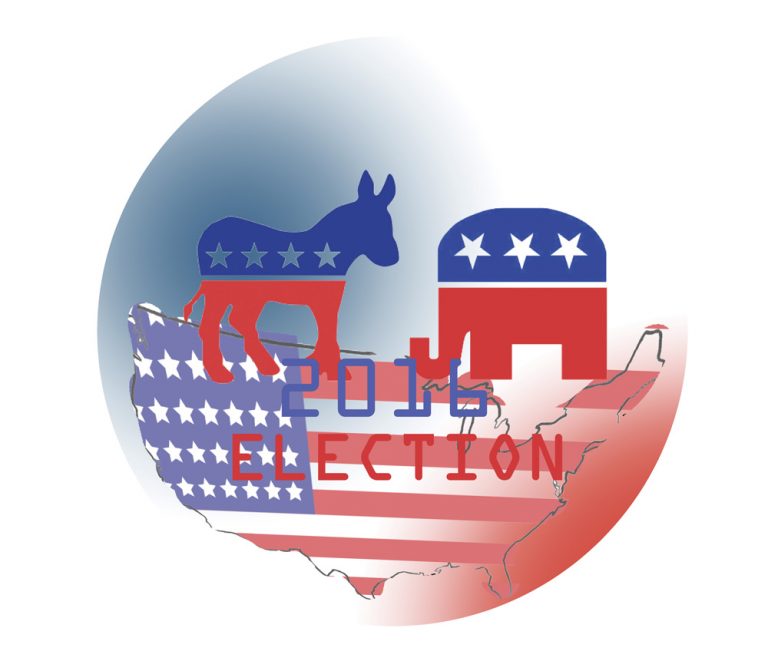
Arturo Samaniego
Staff Writer
Divisiveness has always been somewhat present in our politics, going all the way back to the first truly competitive race for the presidency between John Adams and Thomas Jefferson. From that election to now, there has been a multitude of insults levied between opposing candidates, some based on their policies, others on their character.
This election cycle has proven to be no different. Divisiveness that has long been a cornerstone of our politics was finally brought front and center. The ugliness and partisan divide witnessed this election can be traced to the fact the two main candidates, Hillary Clinton and Donald Trump, are the most widely disliked nominees ever to run for the presidency.
One has to only look at the polls conducted on the eve of the election to see the great distaste voters held for both candidates. As reported by a Post-ABC and Washington Post tracking poll conducted from October 26 – 29, 47 percent of registered voters held an unfavorable view of Clinton and Trump alike.
Looking at the numbers we really should not be surprised we ended up with the president-elect we got: an election where the winning candidate called his opponent a “nasty woman” on television and declared he would seek her prosecution once the election was over; an election where Clinton, during the debates would refer back to Trump’s statements on women and minorities, but spent little time sharing her vision for America.
Trump’s willingness to personally attack his opponents, giving them childish nicknames such as “lil’ Marco” and “crooked Clinton” all goes back to a simple truth: if you cannot beat your opponent on the grounds of being better, then just make them seem worse. The same goes for Clinton, who again never really translated her vision for America, merely lambasting Trump (rightly) on comments he issued that could be interpreted as xenophobic and misogynistic.
The character assaults and vitriolic comments spewed this election all culminated in an outcome not even the polls saw coming: Trump being elected president. As highly disliked as Trump was by a good portion of the electorate, he had a clear message: America is in shambles and only he can fix it. Again, he viciously attacked his opponent’s character, but at the same time stirred enthusiasm for his campaign.
In this regards, Clinton should have taken a note out of Democratic nomination competitor Bernie Sanders’ playbook and stirred enthusiasm in the white working class and youth vote. She could have talked more about improving the economy and making college more affordable, and a bit less on Trump’s shortcomings.
Character assault is nothing new to elections. It was present in 2012, but it never seemed to be the main focus. A candidate’s character should be weighed when deciding if they are fit enough to serve as president.
Clinton’s private server alongside her campaign’s hacked emails should be reported on the grounds it raises question on her penchant for secrecy and her willingness to bend the rules. Trump’s character should be called into question over some of his comments. As reported by Politico, he stated in response to a sexual assault accusation, “Believe me, she would not be my first choice.”
The problem arises in that, when politicians and the media focused solely on character attacks, voters were robbed of deeper discussion on issues that range beyond the candidate’s personal lives. For example, during the presidential debates a great amount of time was spent on Clinton and Trumps’ scandals, but hardly any time devoted to talking about climate change and how to confront it.
Going forward, if we wish to have an election less divisive and more focused on the issues, then we must start calling on the media and candidates to pay an equal amount of time on both character and issues. We ourselves must also do better a job on focusing on the issues, paying attention to and sharing information that deals with the nuances of a candidate’s policy. Most importantly, we should talk with others of opposing viewpoints on the issues we care about so that we may have a more policy centered election.











It is empowering to say we should blame media for lack of policy talk, but it is enormously simplified. For one, there was not really much policy to talk about on Trump’s campaign, as continuously repeated by the media. It was also popularly cited how his economic policies that did exist would be detrimental, by far, for the nation. For Clinton, in debates, especially the earlier ones, she answered with stance and policy in detail to questions. It is not that the media (which is not some single entity, by the way) or candidates (at least Clinton) were remiss in addressing policy. It is that the viewers, yourself included, I suppose, were negligent in picking up any interest on them, which was reflected with lower TV ratings and more social media discussions about character. It can only be expected that with lower interest, news networks and Clinton would stop repeating what no one cared to hear, and rather address what they did care to hear and make known–how the other candidate was bad.
Your very last sentences, on how we should take responsibility are completely true, if not overly romantic. I think a more sophisticated discussion would consider how exactly we could take steps to allow us to pay attention to the nuances and be able to talk to each other openly on disagreements. An example may possibly include our education system and distribution of media.
Comments are closed.